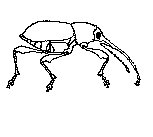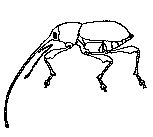CCCI: The Classical Cultural Compatibility Index
Terry Teachout (About Last Night) has come up with an amusing idea: the Teachout Cultural Compatibility Index (list here, explanation here, scores here). It is a list of preferences, in which readers are asked to choose between Dostoievsky and Tolstoy, Count Basie and Duke Ellington, cats and dogs, Schubert and Mozart, and so on. Since Teachout gives his own preferences in the first post, readers can see how compatible their own tastes are with his. I may post my own answers elsewhere, though they are somewhat embarrassing: I was unable to express any preference in fully half of them, because I am unfamiliar with one or both of the choices offered. In one case (Liz Phair or Aimee Mann?) I don't even know whether the choices are dancers, painters, sculptors, singers, or what. I do agree with Teachout in 36 of the 50 on which I have an opinion, for a TCCI of 72% -- not quite the highest so far reported. [Update: When I finished calculating the number was actually 75%: 36 of 48. I seem to have become even less decisive in the interval.]
In a further twist, Aaron Haspel (God of the Machine) suggests that it would be interesting (and maybe even useful) to cross-correlate the various choices: "if we find, for example, that nearly everyone who prefers Astaire to Kelly also prefers Matisse to Picasso and Keaton to Chaplin, then we might be on to something". Too bad he's too lazy to actually do the work. That's not a serious criticism: so am I.
However, I am not too lazy to put together a similar (and even longer) list for Classics, which I present here. But first, some Preliminary Notes:
- My list is very heavy on the literature, light (if not weightless) on the history, art, and archaeology, reflecting my own rather narrow interests. Others are invited to compile their own lists, though a link would be polite.
- A few, including the first two and the last one, did not seem reducible to dyads, so I give three choices. These are marked with asterisks. This does not seem to violate the spirit of the exercise, though it would complicate the calculations in any attempt at a Haspelian analysis.
- Not all the choices work the same way. As Teachout puts it, explaining his own list (second link above): "Some measure your preference for opposing but not mutually exclusive alternatives . . ., while others require you to make an either-or choice. . . . . Some, by contrast, ask you to choose between similar but not identical alternatives . . . . A few ask you to choose what I consider to be the lesser of two evils." I have included all four categories here, though readers will no doubt have various opinions about which choices fall into which categories.
- The question in each case is not which is better, but which you prefer. As Kingsley Amis once put it, "Importance is not important". The CCCI is not a measure of general reputation, but of personal opinion. Be not ashamed to confess a preference for Bacchylides over Pindar, or Simonides over Sappho, if that is how you feel.
- I will reveal my own preferences at some point, though I must confess that I haven't made up my mind in every case.
- In a few cases, I expect all or nearly all readers to vote the same way. However, I may be wrong, given the perversity of the human soul and the eccentricity of the scholastic mind.
- If readers show sufficient interest, I will post each dyad or triad separately, one or two per day, for individual comment and argument. If I can handle the technicalities (so far, signs point to yes) I may even add polling software for some or (theoretically) all of them, so we can all vote -- anonymously, of course.
- Watch the italics. Number 3 contrasts two literary works, number 6 two historical figures.
- Comments and questions on the general subject of the CCCI are welcome here: just click on 'Comments' at the end of this post. Comments on particular dyads or triads should be saved for the individual posts.
And now, without further ado:
The CCCI
- *Aeschylus, or Sophocles, or Euripides?
- *Agricola, or Germania, or Dialogus de Oratoribus?
- Ajax, or Philoctetes?
- Amores, or Ars Amatoria?
- Anabasis, or Memorabilia?
- Antony, or Cleopatra?
- Antigone, or Oedipus (Tyrannus, I mean)?
- Apollonius of Rhodes, or Apollonius of Perga?
- Archilochus, or Hipponax?
- Archimedes, or Ptolemy?
- Aristophanes, or Menander?
- Athenian navy, or Spartan army?
- Augustus’ Res Gestae, or Marcus Aurelius’ To Himself?
- Aulus Gellius, or Plutarch’s Moralia?
- Ausonius, or Prudentius?
- Birds, or Clouds?
- Books, or Journal Articles?
- Byzantium, or Constantinople?
- Caesars: Julius, or Augustus?
- Callimachus’ Aetia, or Ovid’s Fasti?
- Callimachus’ Iambi, or Horace’s Epodes?
- Catullus’ epigrams, or Martial’s?
- Catullus’ love poems, or Propertius’?
- Cicero: Verse, or Prose?
- Cicero: Oratory, or Treatises?
- Cicero’s philosophical works, or Seneca’s?
- Cicero’s letters, or Pliny’s?
- *Pre-Classical, or Classical, or Post-Classical? (both languages)
- Claudian, or Ammianus Marcellinus?
- Curse Tablets, or Potsherds (I mean the ones used for ostracisms)?
- De Bello Gallico, or De Bello Civili?
- Demosthenes, or Cicero?
- Ennius, or Lucilius?
- Epistulae Heroidum, or Epistulae ex Ponto?
- Ethics, or Politics?
- Euripides’ Ion, or Plato’s?
- The First half of the Aeneid, or the Second?
- The First Triumvirate, or the Second?
- Gadarene Epigrammatists: Meleager, or Philodemus?
- Galliae: Cisalpina, or Transalpina?
- Gilgamesh, or Who cares, since it’s not in Greek or Latin?
- Gorgias, or the Gorgias?
- Greek, or Latin?
- Greek Anthology, or Latin Anthology?
- Heraclitus, or Democritus?
- Herodotus, or Thucydides?
- Herondas, or the Priapea?
- Homer, or Vergil?
- Horace: Odes, or Epistles?
- *Horace’s Satires, Persius, or Juvenal?
- Housman, or Wilamowitz?
- Ibis, or Medicamina Faciei Femineae?
- Iliad, or Odyssey?
- Iphigenia in Tauris, or Iphigenia in Aulis?
- Caring, or not caring that Tauris in the previous question is a Latin plural and Aulis an English singular?
- Isocrates, or Life is too short to bother?
- Livia, or Agrippina?
- Livy’s Rape of Lucretia (1.57-60), or Ovid’s (F. 2.685-852)?
- Longinus, or Aristotle’s Poetics?
- Longus, or Heliodorus?
- Lucan, or Lucian?
- Lucretius, or the Georgics?
- Lycophron, or Nicander?
- Manilius, or Persius?
- Marcus Argentarius, or Marcus Aurelius? (both wrote in both languages)
- Martial on sex, or Martial on money (and property, class, power, and ambition)?
- Martial’s flattery of Domitian, or Statius’?
- Massive Commentaries: British, or German?
- R. G. M. Nisbet, or John Henderson?
- Nonnus, or Silius Italicus?
- OCTs, or Teubners?
- Olympus, or Oulumpos?
- Cicero on Catiline, or Sallust on the same?
- Orpheus’ catabasis (Georgics IV), or Aeneas’ (Aeneid VI)?
- Ovid’s Metamorphoses, or Apuleius’?
- Pacuvius, or Accius?
- Parmenides, or the Parmenides?
- The Parthenon, or the Pantheon?
- The Persian War, or the Peloponnesian?
- Petronius, or Tacitus?
- Phaedrus the Roman fabulist, or Phaedrus the Platonic dialogue?
- Physics, or Metaphysics?
- Pindar, or Bacchylides?
- Pirates, or Gladiators?
- The Plank (apotympanismós), or the Pit (Bárathron)?
- Plato’s Symposium, or Xenophon’s?
- Plato’s Republic, or Cicero’s?
- Plato’s Laws, or Cicero’s?
- Plato’s Apology, or Apuleius’?
- Plautus, or Terence?
- Plutarch’s Lives, or Suetonius’?
- Prometheus Bound, or Seven against Thebes?
- Propertius, or Tibullus?
- Pseudo-Tibullus, or Pseudo-Vergil?
- Roll, or Codex?
- Sallust, or Livy?
- Sappho, or Simonides?
- Satyr Plays, or Satires?
- Semonides on Women (Fr. 7), or Juvenal on Wives (Satire 6)?
- Senecan Tragedy, or Seneca’s Prose?
- Siculate sigmas, or the other kind?
- Knowing (or stopping to look up) the technical name for the other kind, or Not knowing and not caring?
- Socrates, or Diogenes?
- Statius’ Achilleid, or Claudian’s De Raptu Proserpinae?
- Stoics, or Epicureans?
- Syme, or Momigliano?
- Tacitus’ Annales: I-VI (Tiberius), or XIII-XVI (Nero)?
- Textual Criticism, or Literary Criticism?
- The Elder Pliny, or the Younger Pliny?
- The Elder Seneca, or Quintilian?
- The Greek Novel, or the Roman Novel?
- Theocritus’ pastorals, or Vergil’s?
- Theognis, or Solon?
- Theogony, or Works and Days?
- Trojan Women, or Medea?
- Utopias: Aristophanes’ (Ecclesiazusae), or Plato’s (Republic)?
- Us and Vs in Latin, or just small u and large V?
- Velleius Paterculus, or Valerius Flaccus?
- Vergil, or Ovid?
- Verse, or Prose?
- Vitruvius, or Plotinus?
- Xenophon of Athens, or Xenophon of Ephesus?
- *Your personal library: Ink Annotations, or Penciled Notes, or Pristine Pages?
Posted by Michael Hendry at July 9, 2004 01:14 PM
Excellent list ... I like that it's heavy literature-based because it can contrast nicely with a 'rogueclassicism index' ... then folks can decide whether they're more 'classicist' than 'rogueclassicist'. I'll come up with a list this weekend.



